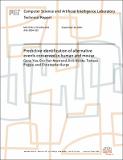Predictive identification of alternative events conserved in human and mouse
Author(s)
Yeo, Gene; Van Nostrand, Eric; Holste, Dirk; Poggio, Tomaso; Burge, Christopher
DownloadMIT-CSAIL-TR-2004-059.ps (47.30Mb)
Additional downloads
Metadata
Show full item recordAbstract
Alternative pre-messenger RNA splicing affects a majority of human genes and plays important roles in development and disease. Alternative splicing (AS) events conserved since the divergence of human and mouse are likely of primary biological importance, but relatively few such events are known. Here we describe sequence features that distinguish exons subject to evolutionarily conserved AS, which we call 'alternative-conserved exons' (ACEs) from other orthologous human/mouse exons, and integrate these features into an exon classification algorithm, ACEScan. Genome-wide analysis of annotated orthologous human-mouse exon pairs identified ~2,000 predicted ACEs. Alternative splicing was verified in both human and mouse tissues using an RT-PCR-sequencing protocol for 21 of 30 (70%) predicted ACEs tested, supporting the validity of a majority of ACEScan predictions. By contrast, AS was observed in mouse tissues for only 2 of 15 (13%) tested exons which had EST or cDNA evidence of AS in human but were not predicted ACEs, and was never observed for eleven negative control exons in human or mouse tissues. Predicted ACEs were much more likely to preserve reading frame, and less likely to disrupt protein domains than other AS events, and were enriched in genes expressed in the brain and in genes involved in transcriptional regulation, RNA processing and development. Our results also imply that the vast majority of AS events represented in the human EST databases are not conserved in mouse, and therefore may represent aberrant, disease- or allele-specific, or highly lineage-restricted splicing events.
Date issued
2004-09-30Other identifiers
MIT-CSAIL-TR-2004-059
AIM-2004-022
Series/Report no.
Massachusetts Institute of Technology Computer Science and Artificial Intelligence Laboratory
Keywords
AI, alternative splicing, comparative genomics, classification, regularization